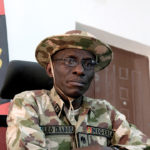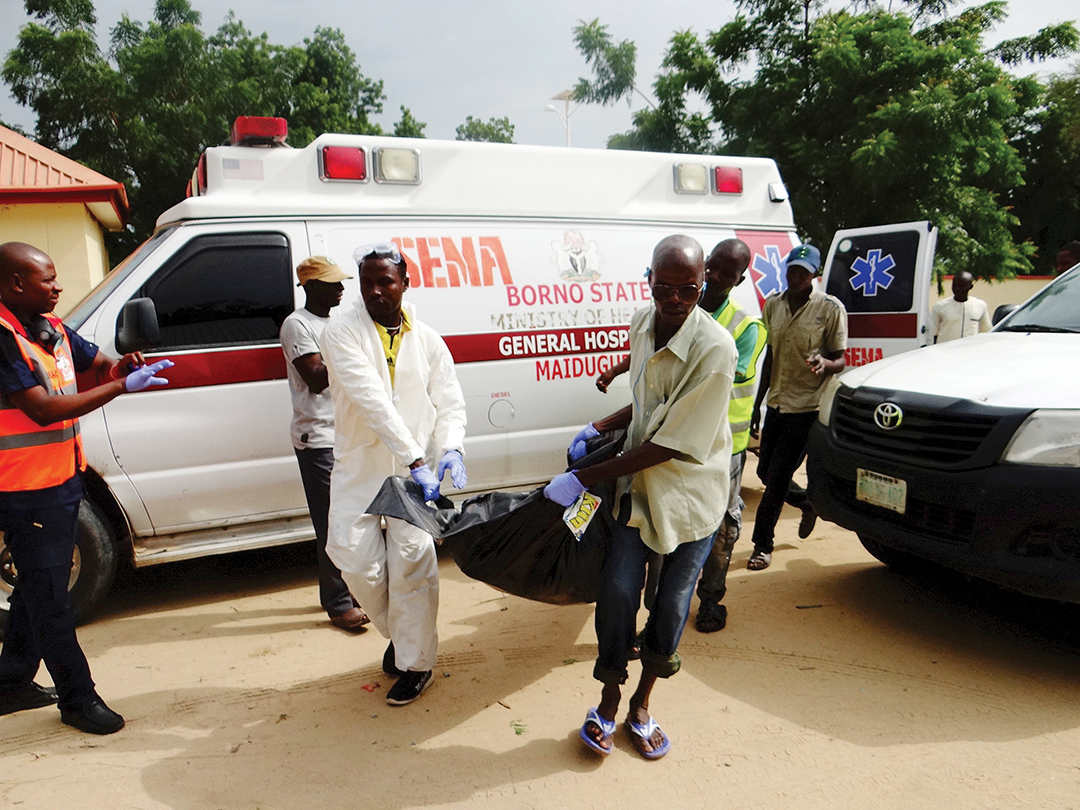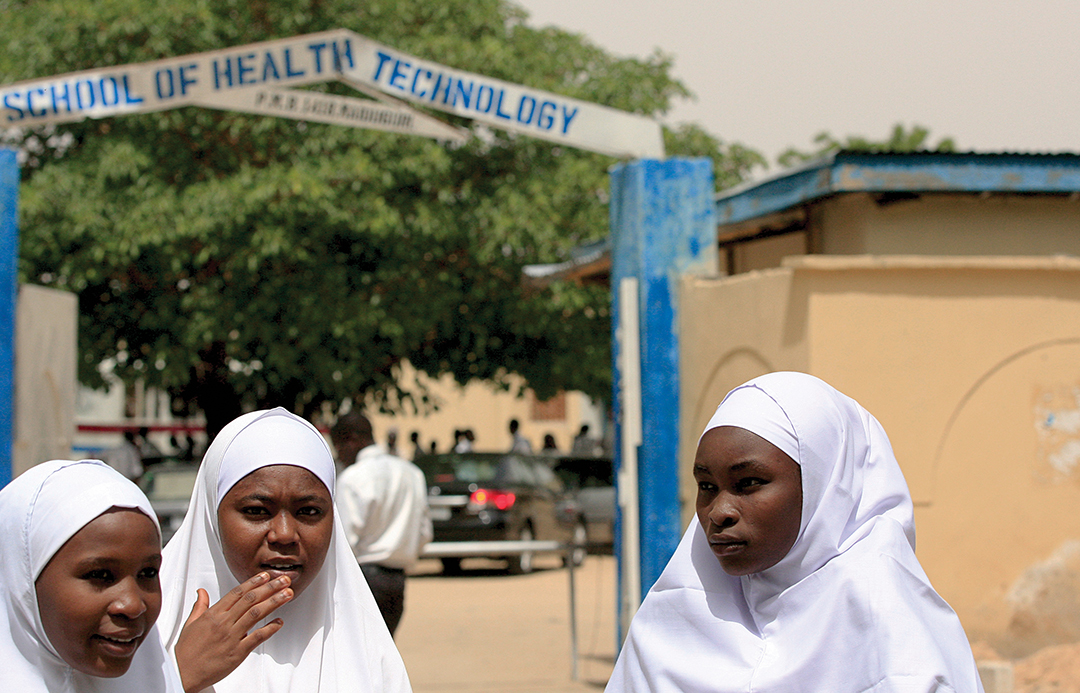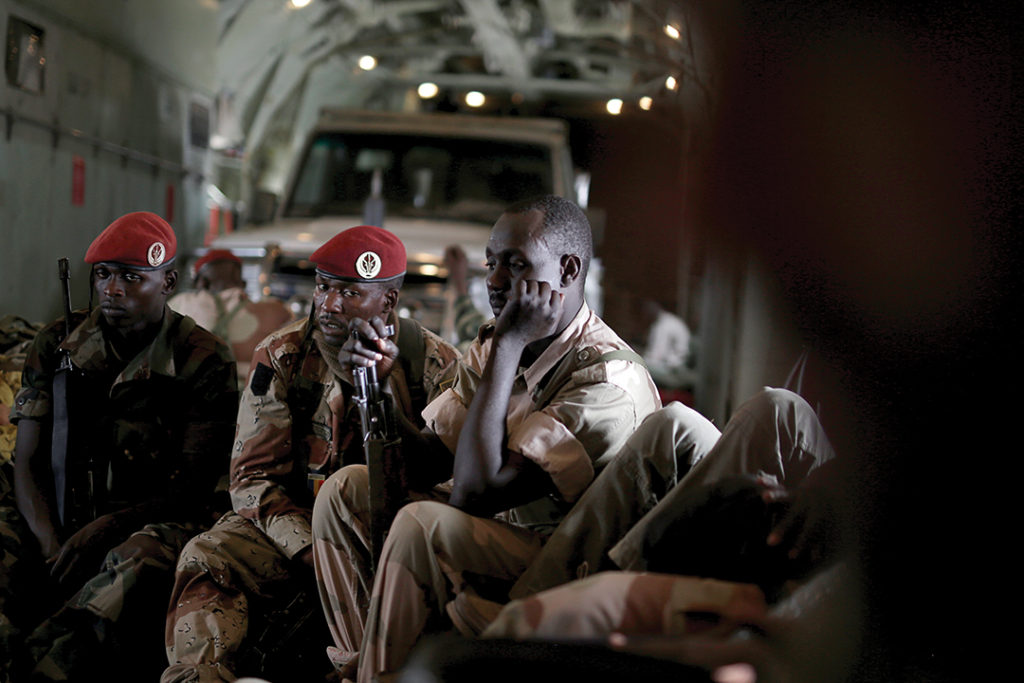The Commander of a Regional Force Believes Stability and Peace Will Brighten the Future of the Lake Chad Basin
ADF STAFF

Nigerian Army Maj. Gen. Lucky Irabor is commander of the Multinational Joint Task Force (MNJTF) headquartered in N’Djamena, Chad. From 2016 to 2017 he served as theater commander of Operation Lafiya Dole, Nigeria’s military mission to defeat Boko Haram. A signals officer, he has served in numerous peacekeeping missions including the Economic Community of West African States Monitoring Group in Sierra Leone. He also served as 3 Division Signal Brigade commander in Nigeria’s northeast and, at the direction of the president, established the Command and Control Center in Maiduguri in 2015 to coordinate the counterterror effort. He spoke to ADF by phone in November 2017 from the MNJTF headquarters. His remarks have been edited to fit this format.
ADF: In March 2016, you were appointed theater commander of Operation Lafiya Dole. What were your thoughts when you received this assignment, and what did this operation represent in terms of a new strategy?
Maj. Gen. Irabor: In January of that year I was posted to be the deputy theater commander and so, in just a span of three months, I was appointed theater commander. So, of course, it brought a whole new challenge to me even though I was aware of what the issues were. I was already privy to what the chief of Army staff had intended for the approach to be. I was able to quickly come to terms with what I needed to do in the theater in terms of realigning the command philosophy, also issues having to do with logistics, troop morale and training requirements. We needed to have a very good rapport with the higher command chain: the chief of Army staff and the chief of defense staff. That relationship had to be properly understood to make sure that whatever actions one was taking in the field had the desired impact. These were some of the challenges one had to confront, and if you get that aspect of the operation right, then you’re likely to make headway.
ADF: When Lafiya Dole was first announced, much of the territory of northeast Nigeria was either in the process of being liberated or already had been liberated. Between February and May 2015, 36 towns were retaken from Boko Haram. It seems like the most important thing for Lafiya Dole to accomplish was holding and securing territory. Is this correct?

ADF: The worst year for suicide attacks was 2015, when Boko Haram conducted 101. The next year it decreased, and it has not returned to previous highs. Were there strategies that you used to combat the asymmetric threat?
Maj. Gen. Irabor: What we did was procure equipment for countering IEDs; that had a lot of impact on the troops. Each time we had an incident of a VBIED attack on the troops it was quite demoralizing; it was quite devastating. So we made an effort to procure some of the counter-IED equipment, which boosted the morale of the troops and reduced the impact of the attacks. We also increased our intelligence gathering to know the sources of the IED materials and where they were located. We made a concerted effort to locate them and have them destroyed. That helped to reduce the incidents until they resorted to using girls as tools to carry these devices to evade some of the measures that we were undertaking.

Maj. Gen. Irabor: I remember it very vividly. It was an operation that I planned along with my commanders and staff. We took time to deliberate and to know what to do. It was very strategic. Before that operation, Boko Haram and its leader Abubakar Shekau, specifically, appeared like they were skilled and dangerous. When we entered Sambisa Forest and Camp Zairo precisely, the myth that surrounded the forest and the leadership of Boko Haram was broken. That sense of the inviolability of his command structure was broken. We code-named it Operation Rescue Finale. It made a lot of impact. It precipitated the release of additional Chibok girls. After that, the pressure was much more on the leadership of Boko Haram. They had no choice but to increase the negotiation with the federal government and quickly release some of the Chibok girls. For our part we felt that we made a serious gain in terms of going into that forest, and the troops were really motivated. Any victory like that is a morale booster, which helped us to galvanize the troops to greater measure. It also weakened the Boko Haram terrorists, especially the Shekau faction. After that operation, Shekau and his leadership have never been seen. In terms of the importance of retaking Camp Zairo, we say it was quite strategic and actually the high point of the operation while I was theater commander.
ADF: The Multinational Joint Task Force was activated in 2015, and you became force commander in 2017. Are countries now working together in joint operations? Are they sharing intelligence? How has the MNJTF improved bilateral and multilateral security relationships in the region?
Maj. Gen. Irabor: The relationship has not only improved, it is now at its best. The agreement and the cooperation with the political leadership has trickled down the entire chain of command. On the ground, the sector commanders have been mandated to have bilateral operations with different national operations. There is an understanding that you can’t just work within your borders because the threat does not respect borders. We have changed the stovepipe arrangement that once existed. That has helped us to remove the mistrust that existed for a long time. Additionally, the intelligence agencies are now sharing information. We have a common platform where there are exchanges of intelligence on issues that have to do with this operation. The cooperation is at its best, and I’m hopeful that that will be sustainable beyond the containment of this threat. I think that is something that we could leverage in the future in terms of development.
ADF: Is there a weakness in the MNJTF that needs to be corrected?
Maj. Gen. Irabor: Of course, in every engagement you always find there are challenges. For now, the resources are a huge challenge. Beyond the resources in terms of logistics, we equally have the challenge of intelligence. Intelligence can never be sufficient. The operation that we are conducting is intelligence-driven. For you to make a significant impact will require intelligence to fine-tune your operations and be more decisive. We also know that the troop-contributing countries are not all on the same page in terms of capacity. It’s not uniform across the board. But, of course, that’s an opportunity for us to begin to know what we need to harmonize in the future. There are also issues that have to do with other stakeholders outside of the LCBC [Lake Chad Basin Commission] countries who, based on biases they had in the past, have made it hard to receive the type of support in terms of quantity and at the time it is desired. Now, everyone is beginning to understand that the MNJTF is not as they thought. Things are much better. We hope that line of thought will be strengthened and reinforced to get greater support to overcome this challenge. But I don’t give in to such challenges. I believe there’s always an opportunity to improve upon whatever one has on hand. I believe in convincing those who are “doubting Thomases” for them to know that a greater good lies in what we have here.
ADF: Do you see the MNJTF as a model for other regions facing similar transnational extremist groups?
Maj. Gen. Irabor: I do see the MNJTF as a model. Only two months ago, the G5 Sahel leadership was here to study what we’re doing and see what they need to ensure they get their foot on the right ground. I’m hoping to pay a visit to them, because I believe their force will be complementary to what we are doing.
In threat management you must understand the local specifics of various regions or subregions. The countries of the LCBC have a common understanding of what the threat is and what the impact is. It’s also knowing that no man is an island to himself, we’re better together, and the joint approach is necessary for solving a problem. That helps to galvanize the cooperation. Going forward, if other regions where you have similar threats can have that common understanding to know that prosperity is in the shared interest of all nations, it will be easier to craft conflict management mechanisms. What we have here is a good model that others can copy. Of course, there is room for improvement, and we are already beginning to review the concept of operations and see where we can strengthen it. But it’s a good model.
ADF: Now that the insurgency is degraded, what needs to happen in the coming year to consolidate these gains and lay the groundwork for an enduring peace?
Maj. Gen. Irabor: First and foremost, we are not suspending our military operation, we are rather going to sustain it. That is key for any other measures we’re going to take. [In November 2017] we concluded the first meeting on stabilization of the Lake Chad Basin. We’re beginning to look at how to craft a strategy to stabilize the region. We need to implement measures to improve the local government structures within the various states. We need to do more to ensure that education is prioritized. The Lake Chad Basin was left an ungoverned space for a long period of time. We believe that the empowerment of the people, especially women and children, will be critical. We also believe the local, traditional conflict management mechanisms can be incorporated into what we have going forward. There also needs to be serious youth engagement. If you come around here, you will find a good number of able-bodied youths who are more or less idle. So, measures to take them off the street so they can be engaged constructively would be very useful.
It’s very critical for other strategic partners outside the region to understand what the challenge is and what kind of support needs to be given. Let it be very transparent, objective-driven, purposeful. Giving support to the MNJTF is not just support to them alone; it is support to strengthening the peace and security of the entire world. If greater support is given to the kind of engagement that we have here, it will have an impact on other parts of the world. Terrorists can be grown from anywhere and travel to perpetrate their acts on other parts of the world. When very objective and transparent support is given to what we are doing here, we will be strengthening peace and security globally.

